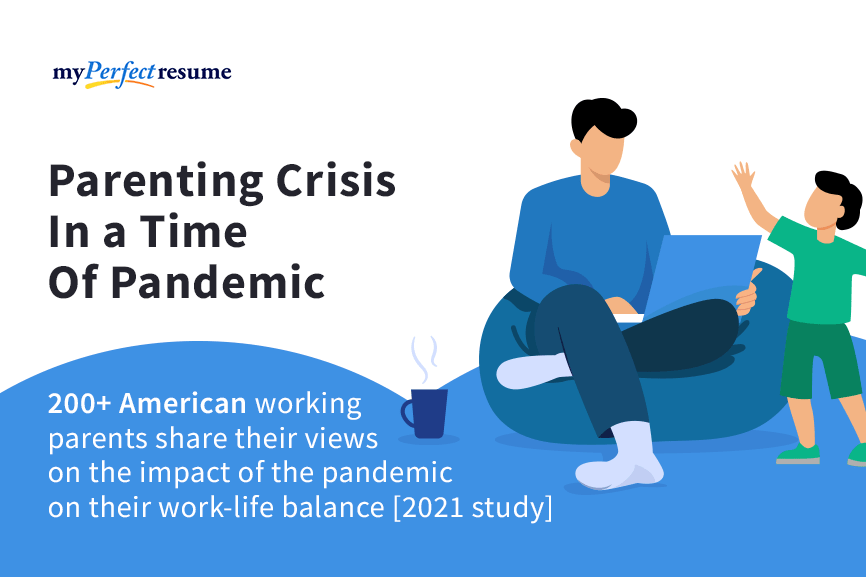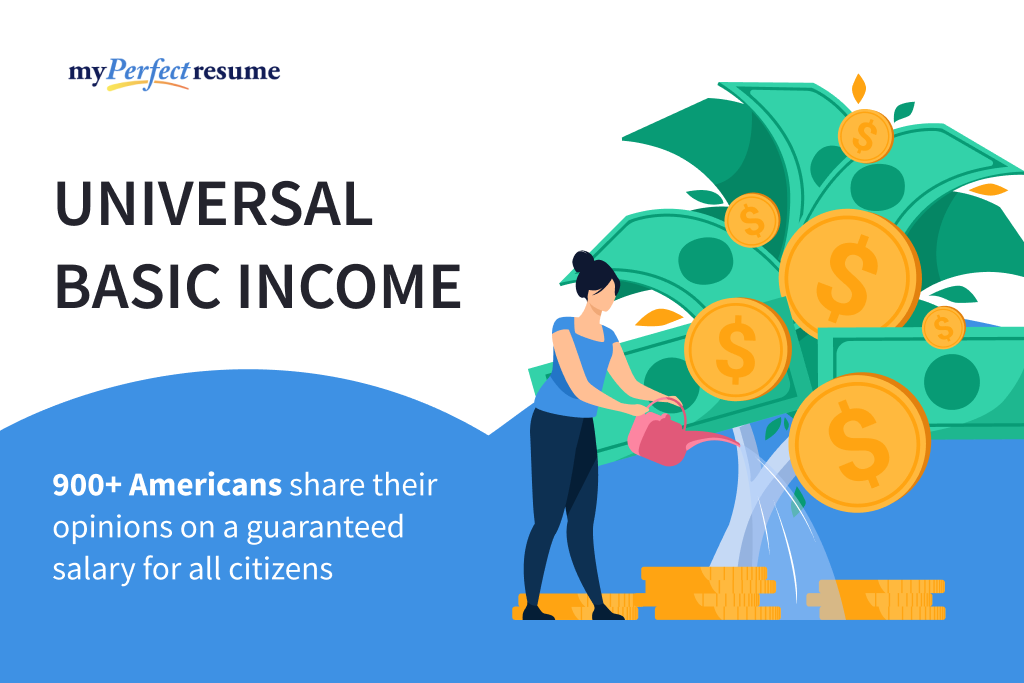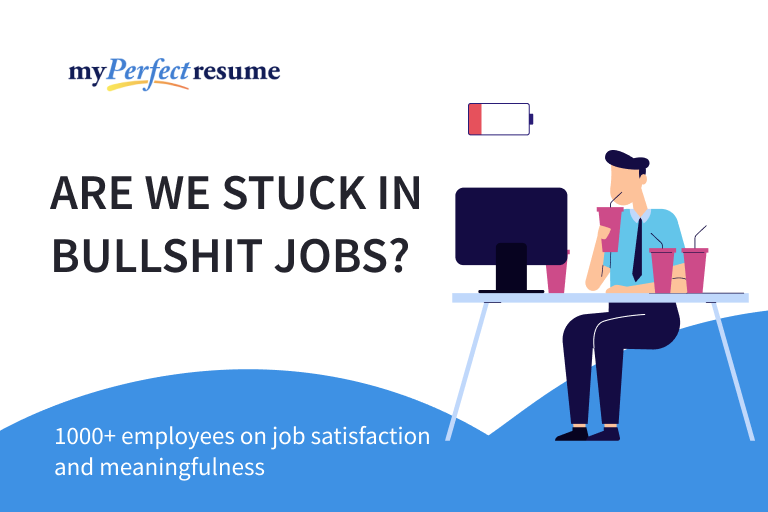Parenting Crisis in a Time of Pandemic
MyPerfectResume.com [February 10, 2023],
[https://www.myperfectresume.com/career-center/careers/basics/parenting-during-pandemic]

Our customers have been hired at: *Foot Note
It’s been more than a year since the WHO announced the COVID-19 outbreak as a pandemic. Since then, it has touched every portion of American society, and millions are suffering, hungry and grieving.
However, there's a particular group that the pandemic has significantly impacted. With disrupted work and home life, the current situation has been a continuing nightmare for working parents. For months they’ve been stretched to breaking point—acting as caregivers, educators, and breadwinners at once.
Working parents, especially mothers, have always worked a double shift—a full day of work, followed by hours spent on childcare and household labor. Now the routines that made this possible—including school and childcare—have been upended.
And it seems that parents' situation in the labor market, although difficult, won’t improve any time soon. To explore this further, we've asked American working parents about their views and opinions on the effects of COVID-19 on their professional and private lives.
We set out to understand working parents' current situation—their needs, hopes, and fears. To achieve that, we surveyed more than 200 of them and discovered some interesting findings.
Read on to see what they told us.
Parents under pressure
It's well-established that Americans are workaholics. However, part of the legendary American Dream is domestic success to match professional achievements.
And while gender roles and our visions of domestic bliss have evolved, the pressure for perfection remains enormous.
Worse still, our study results show that gender norms haven’t changed as much as you may think.
According to our respondents, more than 60% of both men and women face a lot of pressure to succeed at work. This isn’t a big surprise, as evidence of public pressure and stress among Americans can be found in many studies on this topic.
However, women experience a much higher pressure than men to be involved parents, 74% vs. 46%. Nowadays, we’d hope that equal rights for women and men and equal division of duties should be the norm. But our research shows women have a much heavier pressure to be involved in parenting vs. men, while expectations for professional success remain the same.
"So American women end up crushed between the twin pressures of needing to succeed in their career while at the same time being involved parents. It’s a massive challenge."
That’s not to say that men have it easy. They suffer the pressures of professional success too, and the old stereotype of being the breadwinner remains a heavy burden. But it’s clear that the expectation to be an involved parent, though significant, is significantly lower for the man of the house.
The fight to stay productive
Let's face it, dealing with such pervasive and overwhelming pressure is difficult. As a consequence, both our domestic duties and our professional performance suffer.
More than a third of our respondents stated that they can't give 100% at work due to balancing work and family life. What’s more, 42% of respondents have had to reduce working hours due to balancing work and parenting responsibilities.
The statistics are even more striking when we break them down by gender. Once again, women fare much worse. 43% of women can't give their best at work, and over 55% had to reduce working hours. But by both of these measures, men are in a much better situation as only 30% had to reduce their working hours and experience not being able to give their best at work.
This leads us to whether working parents feel their employer always expects them to be available. Once again, women bore the brunt of the pressure, with 75% reporting this expectation compared to 59% of men.
It is difficult to say whether this is due to the lower work performance caused by the reduction of working hours, the inability to do their best at work, or the increased household duties that impact the professional ones.
It’s a vital factor to consider, so the division of household duties is the next issue we examined in our study.
An unfair division?
Consider these findings:
- 36% of women changed their job status during the pandemic.
- 17% of them did this due to childcare or household responsibilities.
- Another 19% were forced to do so due to health reasons.
This means that more than a third of American working women have had their working lives negatively impacted due to the pandemic.
Other studies also confirm this situation. Nearly one million American mothers left the workforce, with Black, Hispanic, and single mothers among the worst affected. The unemployment rate peaked at an unprecedented level in April 2020 at 14.8% before declining to a still-elevated level in December at 6.7%. Nearly one in four children experienced food insecurity in 2020, which is closely related to parental income loss.
Could this be due to the uneven share of household chores and the overwork women are experiencing?
Although our findings do not paint a pretty picture for working women, there remains hope that this may not always be the case.
Here’s what women have to say about the division of labor:
- 36% of women believe they do most of the household chores.
- But another 37% of female respondents believe they split household chores equally.
As for men?
- 41% of them think they split household chores equally.
- But only 15% believe they do most of the household chores.
So we can safely say that around four in ten households split chores equally. But that still leaves the majority of women carrying the heaviest burden.
Things are different when it comes to caring for children, though. Almost half of the female respondents believe that they provide most of the childcare at home. Of the remainder, 30% believe that childcare responsibilities are shared equally.
Moreover, a significant group of men, 20%, believe that they provide most childcare at home. Although considerably smaller, further examination of the group of fathers who take most care of the home and child responsibilities could give valuable insights for future study.
Overall, there’s no doubt that the pandemic has negatively impacted our household chores and childcare responsibilities.
- 73% of respondents have more responsibility for household chores due to the pandemic.
- 80% report that they have more childcare responsibilities due to the pandemic.
Even more alarming, as many as 50% of the respondents agree or strongly agree that it was challenging to handle childcare responsibilities during the coronavirus outbreak. And once again, the gender gap was in full effect. Almost three times as many women as men strongly agreed that childcare was more challenging, 23% compared to 8%.
Among our respondents, the statistics leave no doubt that single parents remain the most affected by the current situation.
55% of single parents lost access to formal childcare services due to the pandemic, which is mirrored by 51% of them changing their job status during the same period.
By comparison, 34% of people living with their spouse state they’ve lost access to formal childcare services due to the pandemic, and consequently, only 29% of them changed job status during that time.
But we did discover one fascinating contrast between single parents and those living with a spouse. A significantly smaller proportion of single parents reported increased difficulty with handling childcare responsibilities, 33% vs. 58%.
The fact that single parents, accustomed to an excess of parental duties, can handle the increased childcare responsibilities much better than their counterparts living with their spouse leaves some hope.
Unfortunately, single parents aren't the only group of American parents affected by the pandemic. The effects of COVID-19 were also severely felt by parents under the age of 39.
53% of younger parents have lost access to formal childcare services as a result of the pandemic. A massive number compared to those aged 38 and over, where 23% experienced the same.
Furthermore, 57% of young parents state that the pandemic has negatively impacted their work-life balance. But this figure was only a little more than that reported by older parents, with 50% reporting the same issue.
What is crucial for young parents, though, is that 57% of them believe that difficulties they've faced in balancing parenting and work may slow down their career growth. This is particularly important considering that professional development is one of the core values for people in this age group.
The Greatest Challenges
The pandemic period is a time of challenges and facing the unknown. Many of us struggle to embrace the new reality and face the travails of living in a pandemic every day.
This situation is particularly difficult for working parents, as their new reality is doubly difficult, as both their lives and their children's lives have been turned upside down. As one of our respondents explained:
"There's no way around it: the world is really scary right now. Now that Coronavirus is sweeping the globe as a pandemic, we're all afraid for the health of ourselves and our loved ones. People all across the world are pinching pennies to make rent and support their families."
But there's more to it than that. Another respondent expressed their daily struggles and hopes for actions that employers can take:
"Converting my house into a workspace suddenly and under an unusual situation like the one we currently live in is complicated, as well as sharing this space with your partner, family, children, or pet. The current situation of working at home, sharing space with my family, without background and without having properly prepared the necessary communication tools, has not been easy. We are facing an exceptional situation where companies have to give their full support and seek all possible facilities to reconcile work and personal life in the same physical space."
Others, on the other hand, although struggling themselves, shared their genuine concerns for their loved ones:
"I am worrying about my daughter's mental and physical health. She is 11 and up until last year, had limited screen time with healthy activity. Now she's on the computer all day, voluntarily, and I can't help her stay active because I'm also on my computer all day."
"We've both been much busier with work, but have considerably less childcare options. The biggest issue was when the preschool closed for two months. Everyone was scrambling to rework schedules."
What there is no doubt about is the fact that all of us, especially parents, are now experiencing continuing and numerous new challenges posed by the pandemic reality. If you're returning to the workforces after parental leave, check out our guide on writing a cover letter after maternity leave for tips from career advice experts. We also recommend using our Cover Letter Generator to make a standout cover letter in a matter of minutes.
So to finish, we leave you with a selection of the greatest challenges reported by our respondents. These are the issues that will need to be addressed to create a better balance for working families.
Methodology
The findings presented were obtained by surveying 214 U.S. working parents via Amazon’s Mechanical Turk. All respondents included in the study passed an attention-check question. They were asked questions related to the impact of the COVID-19 pandemic on their situation in the workforce. These included yes/no questions, scale-based questions relating to levels of agreement with a statement, questions that permitted the selection of multiple options from a list of potential answers, and questions that allowed open responses.
Limitations
The data we are presenting rely on self-reports from respondents. As experience is subjective, we understand that there are many potential limitations with self-reported data as some participants and their answers might be affected by recency, selective memory, attribution, exaggeration, self-selection, non-response, or voluntary response bias.
Some questions and responses have been rephrased or condensed for clarity and ease of understanding for readers. In some cases, the percentages presented may not add up to 100 percent; depending on the case, this is either due to rounding or due to responses of “neither/neutral/unknown” not being presented.
About Us
At MyPerfectResume, we understand the unique challenges of parenting and working from home during the COVID pandemic. Our comprehensive resources, including resume samples (written by certified resume writing professionals), versatile professional resume templates, and a user-friendly resume maker, are designed to help you find a job with a company that supports balancing your career aspirations and family responsibilities. Explore our tools and create a winning resume that showcases your skills and achievements, helping you secure the job you deserve. Start building your future today.
What else can you do to help working parents? Be their voice on the web and share this article with your network of contacts.
If you think your audience will be interested in this information, we’d love you to share it for noncommercial reuse. All we ask in return is that you link back here so that authors get full credit and your readers can view the full study.
How we reviewed this article
Since 2012, we have helped more than 11 million job seekers with our user-friendly tools and career advice articles. We have a rigorous editorial process to ensure that our content is helpful and accurate. Explore our recent employment studies and press coverage, and discover why our certified career experts are a trusted source for professionals worldwide.
Sources
- "America’s Mothers Are in Crisis"
- "The Mystery of How Many Mothers Have Left Work Because of School Closings"
- "Workism Is Making Americans Miserable"
- "Stress in America 2019" - American Psychological Association
- "Unemployment Rates During the COVID-19 Pandemic: In Brief"
- "The Impact of the Coronavirus on Food Insecurity in 2020"
Our customers have been hired at:*Foot Note













